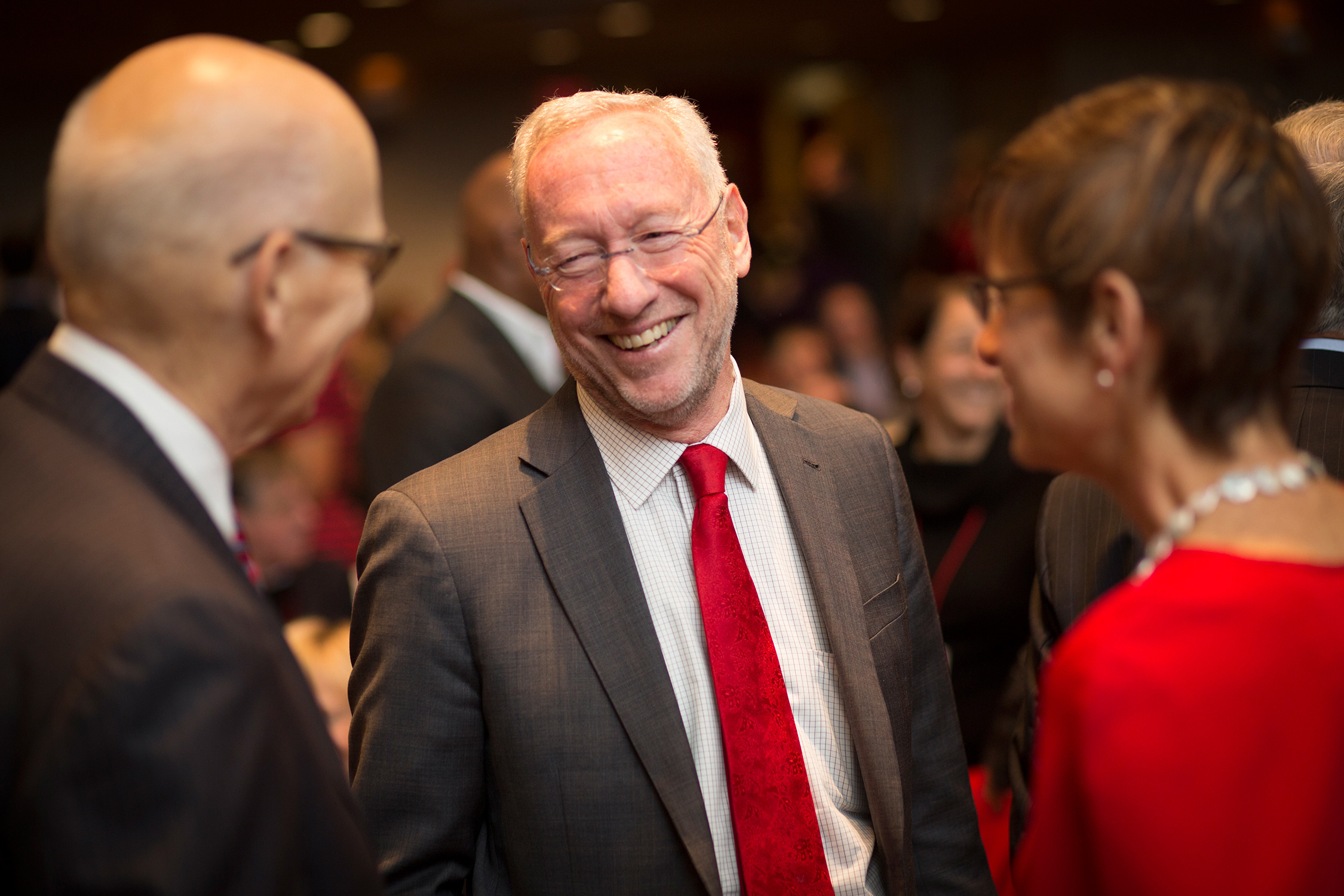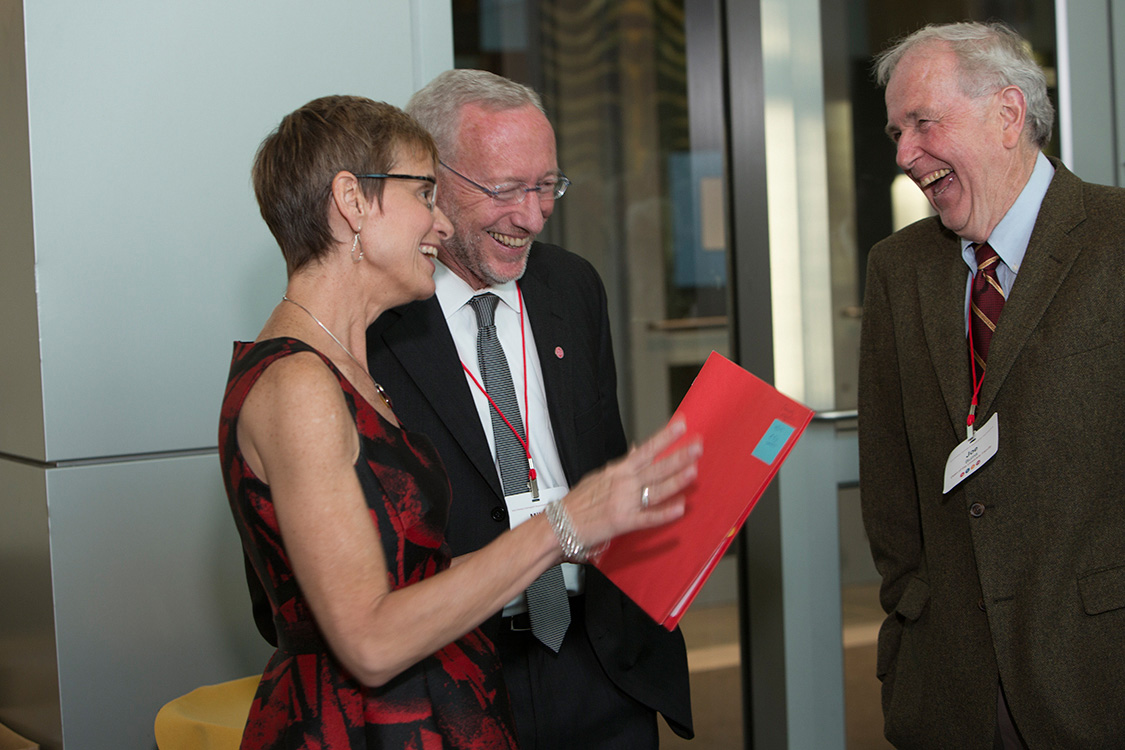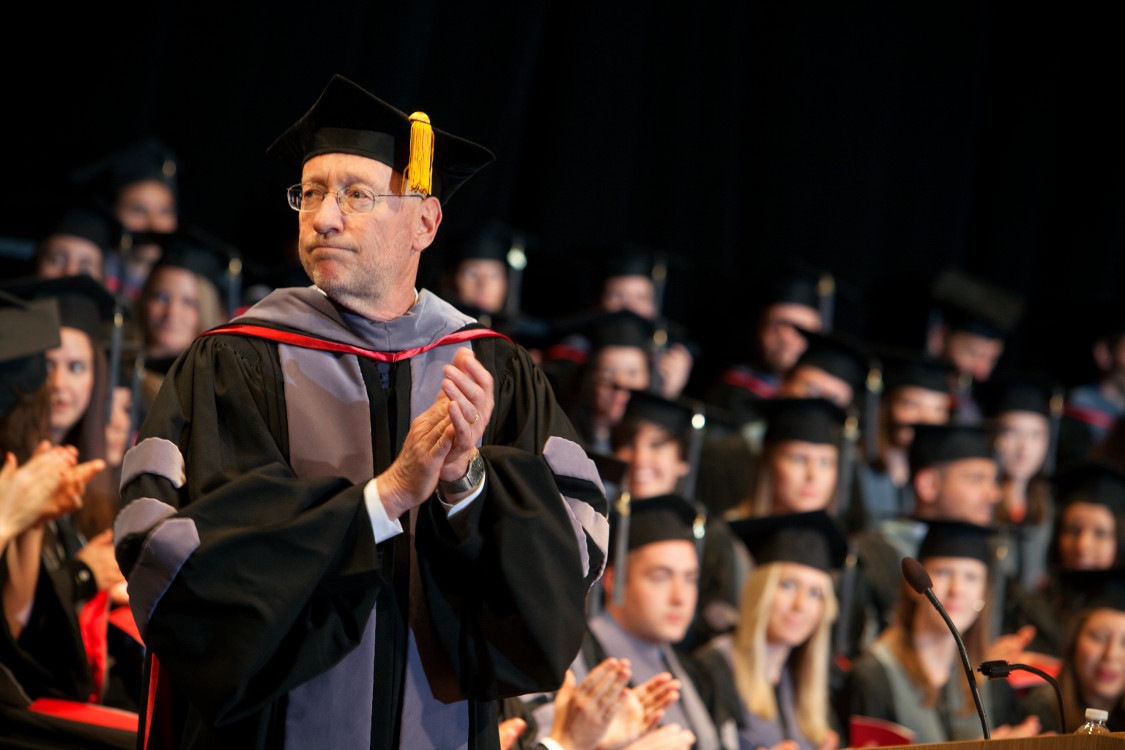Provost tackles 'the challenge and art' of charting the future
By Joe Wilensky

Michael I. Kotlikoff became Cornell University’s 16th provost Aug. 1. Kotlikoff, who served as dean of the College of Veterinary Medicine from 2007-15, discusses his role as the university’s chief academic officer, the strategic planning process that he will lead for Cornell and how his experience as a dean has prepared him for this job.
What lessons from your years as dean will help in planning the university’s future?
I would go back to even before I was dean – I was recruited to Cornell [in 2000, as a professor of molecular physiology] as part of a universitywide strategic initiative in genomics. That process was meant to add value to multiple departments and colleges, and to capitalize on expertise that was present at Cornell, by recruiting cooperatively. Once I was here, I led a similar effort on the part of mammalian genomics, recruiting a number of other faculty.
The departments and colleges were incentivized from the central administration to recruit researchers who were viewed as adding benefit to the university as a whole. The effort recruited faculty to be part of an interdisciplinary initiative and enhanced collaborations in a way that brought departments and colleges together. We haven’t been in a position to do much of that lately, and it’s one of the directions that I want to pursue in multiple areas of research and scholarship across the university.

It is President Elizabeth Garrett’s and my commitment to focus as much of our energies and Cornell’s resources on academic advancement as we can. We will invest in those priorities in a way that enhances the stature and impact of multiple colleges, but also try to make sure that colleges have the resources necessary to advance their individual priorities.
How are you approaching the strategic planning process?
It is essential that we engage faculty and the entire Cornell community and, through that, commit to succeed in whatever we choose to do. I have four broad areas that I would like to make sure we capture as part of our strategic planning.
The first is the curriculum – particularly the undergraduate curriculum; how much the colleges do separately and what we do commonly as a university. I think it is very important for the provost to lead a discussion about what we want a Cornell education to mean for all of our students, what we expect for them in terms of the breadth of education and exposure to diverse areas of thought, and how we foster innovation and independent thought within our curriculum.
A second area relates to the changing landscape of educational technology. We have great assets and institutional experience embedded within eCornell, Cornell Information Technologies, in the library, in the Center for Teaching Excellence, and in our individual colleges. I’d like to catalyze the formation of a plan that facilitates the creative adoption of technology by our faculty at all levels of our curriculum – our on-campus undergraduate, graduate and professional curricula, as well as our distance learning programs at the master’s and certificate levels.
Third, I believe that universities should foster an engaged, as well as an informed, citizenry. We are in the midst of an expansion of Cornell’s long tradition of doing as well as learning through the Engaged Cornell initiative. Integrating Engaged Cornell, our land-grant mission, Cornell Abroad, Expanding Horizons and our programs in New York City is an extraordinary challenge, but also an opportunity that few institutions have. I’d like us to think about how we leverage these in a way that provides opportunities and experiences for our students by thinking broadly about the common elements of these efforts.

The fourth area is research. The effort here is not to define or encompass all research activities at Cornell, but to focus on those areas in which we can cooperate. I’m thinking of initiatives in physical sciences, life sciences and social sciences, but also in humanities, the arts and in areas of broad impact on society such as cancer biology, food security, public health and the sustainability of our ecosystems. The real challenge will be picking those areas where Cornell can excel and where investments will impact our stature significantly, while not reducing our commitments to areas of excellence that are centered within a single college. We will be trying to make wise and strategic choices and also to leave space for individual colleges to pursue research uniquely tied to their missions.
I also want to connect many of these scientific efforts, particularly in the life sciences, with our colleagues at Weill Cornell Medicine. These strategic plans also will generate ideas that will lower the barriers to cross-campus collaborations.
What are your thoughts about President Garrett’s interpretation of “any person ... any study” as she described in her inauguration address, where she stressed the need to focus efforts and resources?
That’s absolutely necessary. Cornell has a fundamental duality: academic discovery and the imperative of impact. To me, Cornell’s uniqueness lies in the fact that we continue to express these two poles that derive from our founders, Andrew Dickson White and Ezra Cornell. You will not find another institution in the world that combines the stature of academic excellence in pure discovery, whether it’s in physics, in humanities, in social sciences or in biology, with the imperative to apply knowledge to better our condition.
These two poles are fundamental to Cornell and will be embodied in our strategic plan. That’s a little different from saying we have to do everything. I think we would all agree that we have to make choices within these commitments to discovery and impact, to pick those areas in which we will be world class, and part of that may mean choosing not to do everything.
One point I would emphasize is that our strategic plan will encompass, at every level and as part of our DNA, “any person.” By recruiting and welcoming all and lowering the barrier of entry, we will always make a Cornell education available to meritorious students independent of where they come from, what they look like and how they think. That imperative extends to our faculty and staff as well as our students. Cornell will always be a place where everyone is welcome, where success is supported and nurtured, and where we have open inquiry, open discussion and open expression. Those values are as true today, in our sesquicentennial year, as they were at our founding.
With the recent leadership changes at Cornell, what is on the minds of the faculty, staff, students and alumni with whom you have spoken?
The last year has been a period of significant change for the university. A new president, a new provost and many new academic leaders, as well as a relatively new budget model for the university. What I’ve heard is an understandable concern about our direction – a desire to address some long-standing issues and to set a strategic direction for the institution.

First, I emphasize at every opportunity that President Garrett and I are committed to academic investment, to bringing the most outstanding faculty, staff and students to our campus and, thereby, to foster learning and discovery and enhance our stature. Second, with respect to the budget model, I emphasize the goals of our new budgeting system – to promote responsible financial management and strategic decision making in our colleges and administrative units. A third concern relates to the deficit position that we have been in for the past few years and our ability to make the decisions necessary to eliminate this problem and invest in faculty and programs. This process is well underway, and I assure our faculty that the leadership of the university – deans, provosts, vice presidents and the president – are committed to advancing all of our outstanding schools and colleges.
Finally, I do hear concerns about our ability to collaborate on a curriculum that has more unified elements within the framework of our new budget model that pools tuition, and whether it will produce the most effective and impactful curriculum for our students. To do so means enhanced coordination between our colleges and, perhaps, common educational elements. I don’t have the answers to what those would be, and I don’t believe it’s the provost’s role to dictate solutions, but it is the responsibility of the provost to lead the discussion.
The rising cost of education is often on the minds of so many alumni, parents and students; where do we go from here, and are there lessons from your initiatives as dean for diversifying the broader university revenue stream?
We really need to do everything that we can to try and lower the pressure on tuition. All the main revenue streams for higher education are under pressure, and our tuition is increasing at a rate that many of us find worrying. However, I must point out that the tuition price does not reflect the true net cost for the almost 50 percent of our students who receive financial aid. The cost of education today is actually significantly lower for many of our students than it was two decades ago because of the aggressive financial aid initiatives led by President David Skorton. That’s a message that the public doesn’t hear very often, but I think it is an important expression of our values. At the same time, our state support and federal grant support have declined or have been flat, and our costs associated with regulatory compliance continue to grow.
This is a costly endeavor. As President Garrett said recently, we don’t do anybody any favors by pretending it’s not. But I do think we need to do whatever we can to contain costs, to think creatively about other revenue sources and, by so doing, advance our core mission.
There are some areas in which Cornell is positioned to be very entrepreneurial, particularly in academic technology. There are areas in the energies sphere and in carbon neutrality where Cornell can be quite entrepreneurial and occupy a leadership position. … I’m thinking of where we’re going, trying to combine these two elements of discovery and application.
The university is coming out of an exciting sesquicentennial, a successful campaign and a presidential transition. How will you help Cornell gain momentum to take on new challenges and opportunities?
The energy and courage of our new president gives me extraordinary confidence that we will succeed. The thing that convinced me to accept this position once President Garrett invited me to become Cornell’s next provost was her commitment and will, and her absolute certainty that we could together build Cornell’s stature. President Garrett is a force of nature.
We’re coming out of a very difficult financial time, we’re looking at opportunities to invest in faculty and academics, and we are committed to enhancing our excellence and securing our future. Both of us have taken on our leadership responsibilities so as to be able to add value to this precious institution. … We’re taking this opportunity to commit ourselves to Cornell’s future.
Media Contact
Get Cornell news delivered right to your inbox.
Subscribe